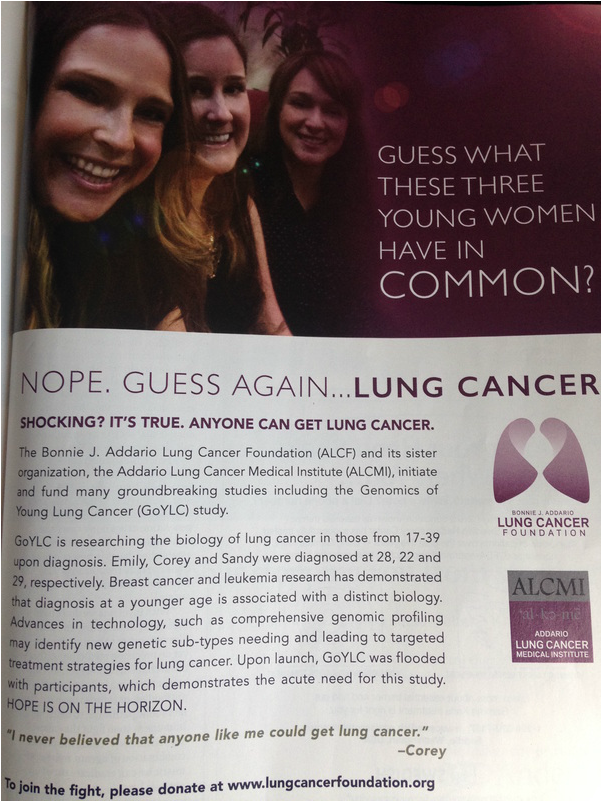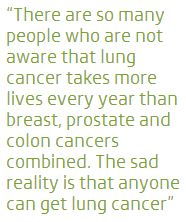|
This article originally appeared at PschologyToday.com on July 26th, 2016. How does the stigma surrounding lung cancer delay diagnosis?by Theodora Ross, M.D., PhD.  Earlier this year, I appeared on NPR’s Fresh Air to discuss my recent book, A Cancer in the Family. During the interview, the conversation turned to ways individuals can reduce their risk for cancer. To make a point, I compared acting on knowledge of one’s genetic risk to smoking: “If you stop smoking or you don’t smoke,” I said, “the chances are you won’t get lung cancer.” Not long after, I received an email from a stranger with a subject line referencing the interview. The sender was a 43-year-old woman from California named Lisa who, despite never smoking or living with smokers, had been diagnosed with advanced-stage lung cancer at age 41. “I have never smoked a single cigarette,” she wrote. “I have never lived or worked with smokers. I have no other *known* risk factors for lung cancer either.” She told me she emphasized the word “known” due to the fact that little research has been done on non-smoking related causes of lung cancer. “I realize,” Lisa continued, “that your reference to smoking and lung cancer was just an off-hand remark and not the main point of your interview. However, lung cancer receives the least research funding of all the major cancers and has one of the poorest survival rates, due in large part to the stigma that statements, even casual ones like yours, perpetuate.” I replied with a lengthy apology for generalizing without providing context. But Lisa’s words echoed. Just hours before I had received that email, a colleague and I had been lamenting that if we could eliminate all incidents of cancer caused by lifestyle choices (many due to smoking), we’d have far fewer cancer cases today. This would leave time to study cancers with unknown causes, which would lead to better and faster diagnoses. And it would help end the stigma surrounding patients like Lisa—a stigma that I had inadvertently perpetuated on a national radio program. The stigmas and stereotypes around lung cancer need to be erased In 1964, when the first US Surgeon General’s Report on the health consequences of Smoking was published, 45 percent of adults smoked cigarettes despite stacks of evidence indicating that cigarettes caused lung and many other cancers. The year before, smoking in America had reached an all-time high thanks in large part to mass-market advertising campaigns during the previous few decades that falsely promoted smoking as a glamorous, even healthful, activity. In 2014, fifty years after that first Surgeon General’s Report, smoking has been identified as a leading cause of twenty-two diseases. Heart disease, which kills more people in the United States each year than any other illness, is at the top of the list. Many other organs dysfunction as a result of cigarettes and of course several cancers other than lung cancer are linked to cigarette smoking. Despite this, lung cancer has been singled out as the “smoker’s disease,” when in fact, it is one of many smoker’s diseases. Unfortunately, this fact leads to a stigma surrounding lung cancer patients—non-smokers and smokers alike—since people assume they could have prevented their disease. For non-smokers like Lisa, this can be an especially surprising twist to an already difficult diagnosis, even though there are many other patients like her. Currently, approximately 20 percent of lung cancer diagnoses in America (about 16,000-24,000 per year) occur in people who have never used tobacco products, and that fraction is on the rise, especially as smoking becomes less popular. (At present, only 15 percent of Americans smoke.) Additionally, many of the remaining 80 percent of lung cancer diagnoses are in former smokers, those who quit years or even decades before their diagnosis. Unfortunately, though, the stigma persists, and it can lead to devastating, even deadly, consequences. The problem of delayed diagnosis A close cousin of the stigma is the stereotype, wherein people make assumptions about someone or something based on preconceived, often incorrect, notions about others like them. Consider Lisa’s scenario: In the Fall of 2013, when she was 40 years old, she went to her doctor reporting fatigue and a cough that wouldn’t go away. Lisa was a fitness instructor, had never smoked, and had eaten a healthy diet for decades. The doctor never considered lung cancer a possibility, and prescribed codeine cough syrup. When the cough did not abate, Lisa returned to the doctor, who then prescribed an albuterol inhaler and antibiotics. Still, the cough persisted, and Lisa even began coughing up small amounts of blood. The doctor upped the prescription to steroids, gave her an Advair inhaler and then prednisone. The cough continued, and while she was on a family vacation, Lisa worsened and went to the local ER for a chest x-ray. She was told she had pneumonia. At this point, a family doctor/friend advised her to visit a pulmonologist. The pulmonologist obtained a chest CT, and Lisa had lung biopsy the following week. In January 2014, after months of misdiagnosis, she was finally diagnosed with Stage IV lung cancer, which has a survival rate of less than 10 percent. The situation was so dire that Lisa was offered “palliative” chemotherapy less than 48 hours after her diagnosis. If Lisa had smoked, her doctor would have known she was high risk and therefore likely ordered a CT scan sooner. But because her medical history did not align with the common perception of who a lung cancer patient is, her diagnosis came late. If we can catch lung cancer early enough for surgery, then we can cure patients. Delayed diagnosis is injustice. Lisa also has a significant family history of cancer (three grandparents and another close relative were all diagnosed with various types) but has not yet received a complete genetic test for inherited cancer gene mutations (those with which patients are born and that are found in all cells of the body, not just the tumor) that may show she is at risk for additional cancers. Patients with lung cancer are rarely sent for a genetic analysis even when, as in Lisa’s case, a genetic test is warranted based on National Comprehensive Cancer Network guidelines. Although, in this case, a test would not change her diagnosis, it could at least provide some much-sought answers about why she developed the disease. Let’s break the stigma Stigmas and stereotypes are lazy. They result from jumping to conclusions based on biases instead of facts, and they lead us into one-track thinking that prevents us from seeing the whole picture. Meanwhile, they wreak havoc on the lives of those who’ve been stigmatized, isolating them from their peers and rendering them the victims of prejudicial forces beyond their control. After I received Lisa’s email, I thought of how, in 1939, my Uncle Jack changed our family name from Rosenblum to Ross in order to increase his chances of getting a job. By changing his name, he avoided the stigmas and stereotypes associated with Jewish people and allowed himself to be considered on an even playing field with all the other candidates. It was unfortunate that such a change was necessary, but he got the job. Lung cancer patients can’t make this choice, so it is up to the rest of us to change our way of thinking in regard to the disease. Hopefully, one day soon people will quit cigarettes once and for all, and smoking-induced lung cancers will be a thing of the past. In addition to preventing suffering, this would allow researchers to dedicate more attention to other causes of lung cancer. In the meantime, let’s combat damaging stigmas and stereotypes by dealing in facts and choosing our words with care. When we do, we not only increase empathy, we save lives. Note: Lisa Goldman, who contributed to this piece, writes about her journey with lung cancer at Every Breath I Take.
0 Comments
7/31/2016 World Lung Cancer Day (August 1st ) Commemorates, Celebrates, and Supports Those Impacted by Lung CancerRead Now
GLENVIEW, Ill. (July 29, 2016) – On World Lung Cancer Day on August 1, the American College of Chest Physicians (CHEST), alongside members of the Forum of International Respiratory Societies (FIRS) commemorates, celebrates and supports those impacted by lung cancer. FIRS joins the grassroots efforts of the lung cancer community to raise awareness about lung cancer and its global impact, creating an educational movement of understanding lung cancer risks as well as early treatment around the world.
Lung cancer is the most common cancer worldwide, accounting for 1.8 million new cases in 2012, and is responsible for nearly one in five cancer deaths according to the World Health Organization. Lung cancer claims more lives yearly than breast, colon and prostate cancers combined. According to the American Cancer Society, an estimated 224,390 new cases of lung cancer are expected to be diagnosed in 2016, accounting for about 14% of all cancer diagnoses in the United States alone. World Lung Cancer Day 2016: Honor, Unite, Inspire highlights the many risk factors to be aware of in order to detect lung cancer at the earliest stage possible. While most understand that smoking is the single greatest risk factor for lung cancer, other lesser known risk factors include environment and genetics. Environmental exposure to radon, asbestos, arsenic, beryllium and uranium have all been linked to lung cancer. The risk of lung cancer also increases with a history of cancer in another part of the body, age, family history, radiation to the chest area and lung diseases like COPD. The initiative also aims to shed light on key symptoms and screening options. Symptoms include change in mucus, chest or back pain, coughing up blood and difficulty swallowing. Tests that may be used to diagnose lung cancer include chest X-rays, CT and PET scans, bronchoscopy and needle biopsies. If you are a current or former smoker and over age 55, you may be a candidate for a low- dose CT scan screening that can offer early detection of lung cancer, potentially at its earliest stages. “Treatment options for lung cancer have significantly advanced over the past few years and survival rates are increasing. We’re hopeful the World Lung Cancer Day efforts will help to continue to raise awareness of risks and increase early detection for the best possible outcomes,” said Dr. Gerard Silvestri, President-Elect of the American College of Chest Physicians. More than 70,000 global FIRS members have united in support of World Lung Cancer Day, including member organizations: CHEST, Asociación Latinoamericana del Thorax (ALAT), the American Thoracic Society, the Asian Pacific Society of Respirology, the European Respiratory Society, the International Union Against Tuberculosis and Lung Disease and the Pan African Thoracic Society. Patients, families and caregivers can download free educational resources and learn more about lung cancer, risk factors, screenings and treatment options by visiting http://www.chestnet.org/WLCD. About CHEST CHEST is the global leader in advancing best patient outcomes through innovative chest medicine education, clinical research and team-based care. Its mission is to champion the prevention, diagnosis and treatment of chest diseases through education, communication and research. CHEST serves as an essential connection to clinical knowledge and resources for its 19,000 members from around the world who provide patient care in pulmonary, critical care and sleep medicine. For more information, visit chestnet.org. About the Forum of International Respiratory Societies FIRS is an organization consisting of the world’s leading international respiratory societies working together to improve lung health globally: American Thoracic Society, CHEST, Asociación Latinoamericana De Tórax, Asian Pacific Society of Respirology, European Respiratory Society, International Union Against Tuberculosis and Lung Diseases and the Pan African Thoracic Society. The goal of FIRS is to unify and enhance efforts to improve lung health through the combined work of its more than 70,000 members globally. Contact: Kristi Bruno, [email protected] The Bonnie J. Addario Lung Cancer Foundation has a full-page ad in the June issue of Delta Air Lines' Sky Magazine! Way to go, guys! Thanks for spreading the word and helping to save lives!
5/10/2016 Patti LaBelle Encourages People to 'Share Their Voice ' in the Fight Against Lung CancerRead NowThis story and video were originally published at People.com by Christina Dugan on May 19th, 2016.
Patti LaBelle is kicking off National Women's Lung Health Week with a powerful message: share your voice.
The legendary gospel singer, 71, has joined the LUNG FORCE initiative through the American Lung Association. LaBelle, who has previously opened up to People about her personal connection to lung cancer, says that there is a lot of information that people aren't aware of. "I don't think people know that it's the No. 1 cancer killer of women, more so than breast cancer, colon cancer and pancreatic cancer combined," the gospel star said in December. "One woman dies every eight minutes in the United States of lung cancer. Bottom line: We all can do more to learn about lung cancer and contribute something to the initiative." In effort to spread the word, LaBelle and a church choir from Harlem have teamed up to create a touching video that encourages people to fight for a cure. "Making the video means so much to me because it's spreading awareness about a very important cause and I know that it is helping people," LaBelle tells People exclusively. In the video, LaBelle says, "I lost many important people in my life to lung cancer. It took two of my sisters in their early 40s and my choir director who helped me find my voice. Because they are no longer here to share their voices, I want to invite everyone to give 100 percent in the fight against lung cancer because 99 and a half won't do. There is hope. The more we come together, the more people will hear our message." She adds, "Thank you so much for sharing your voices. Let's do what we're put on this earth to do – let's all sing!" To donate, visit lungforce.org beginning Tuesday and enter for a chance to meet LaBelle and see her perform at an upcoming concert. by Lynne Eldridge MD. Originally posted on 30 October 2015 at About.com. Many of us have been upset recently as well-meaning organizations have made smoking cessation the focus of lung cancer awareness month. Certainly, encouraging the public to never begin, and to quit if they smoke, is admirable. And for people with lung cancer, quitting may improve survival. Yet lung cancer awareness month should have a different focus. Spreading information on smoking cessation does little overall for those living with lung cancer today. Five months after receiving a diagnosis of lung cancer, only 14% of people with the disease are smokers. To focus on smoking is analogous to making breast cancer awareness month all about informing women that they should have their first child before the age of 30 (to decrease the risk of breast cancer.) Awareness month should be about supporting people with the disease, not about discussing the causes. Awareness month should also be about funding to research better treatments. Those who smoked in the past won't benefit from a lecture about what they may have done differently 20 years ago. Instead, they need treatment today. And for never smokers with the disease--not uncommon considering lung cancer in never smokers is the 6th leading cause of cancer deaths in the U.S.--this focus makes a month designed to celebrate their lives irrelevant. Some people may remain skeptical, but read on for further reasons why lung cancer awareness month should not have smoking cessation as the central focus. The majority of people with lung cancer are non-smokers. This heading is not a typo. The majority—roughly 60% of people—diagnosed with lung cancer are non-smokers. This includes people who smoked at some time in the past, as well as never smokers. In the United States 20% of women with lung cancer are never smokers, with that number rising to 50% of women with lung cancer worldwide. Numbers such as 20% may seem small, until you take a look at the statistics. Lung cancer is the leading cause of cancer deaths in both men and women in the United States. Lung cancer kills twice as many women as breast cancer, and 3 times as many men as prostate cancer. And while around 30 to 40% of people smoke at the time of diagnosis, only 14% of people with lung cancer are smoking 5 months after diagnosis. In other words, the vast majority of people with lung cancer today will not benefit from hearing about the hazards of smoking. Not only is this focus not helpful, but it serves to propagate the stigma of lung cancer as a smoker's disease. Unfortunately this vast majority, including most never smokers, have already been subjected to the blame game. Have breast cancer? Nice. People act loving and ask how they can help you. Have lung cancer? Raised eyebrows accompanied by some variation of the question,"How long did you smoke?" There are many reasons that living with lung cancer can be harder than living with breast cancer. Let's not add cancer awareness month to the list. There are Other Causes of Lung Cancer There are many causes of lung cancer. Even if tobacco had never been introduced on the planet, we would still have lung cancer. Yes, smoking is the leading cause of lung cancer, but causes other than smoking are very important. Though the number seems small—20% of women who develop lung cancer being never smokers—this translates to a fifth of the 71,660 lung cancer deaths in women expected for 2015. Radon exposure in the home is the second leading cause of lung cancer, and the number one cause of lung cancer in non-smokers. Roughly 21,000 people die from radon-induced lung cancer each year, and this cause is entirely preventable. Picking up a radon test kit from the hardware store for around 10 bucks, and having radon mitigation done if the test is abnormal, is all that's needed. Putting these numbers in perspective may help. Around 39,000 women are expected to die from breast cancer in 2015. If we had a $10 test to check for a risk factor, and a procedure costing less than a grand that could completely prevent half of breast cancer deaths, do you think we would have heard? Why doesn't the public know about this? It goes back to the focus of this article; we are placing the emphasis of lung cancer awareness on smoking, and in doing so, are leaving the public with a false sense of assurance that all's well if you don't smoke. There are other causes worth mentioning, from air pollution, to indoor air pollution, to secondhand smoke, to occupational hazards. Don't assume you are safe if you never smoked. Learn about the other causes of lung cancer in non-smokers and what you can do to reduce your risk. People Who Have Quit Smoking Are Still at Risk Quitting smoking certainly reduces the risk of lung cancer, but for most, some risk always remains. The numbers in the last slide attest to this. There are more former smokers who develop lung cancer each year than current smokers. If you smoked in the past, don't fret yet. After 10 years of quitting, the risk of lung cancer decreases by 30 to 50%. There are also some ways of reducing your risk of dying from lung cancer. One method is low dose CT lung cancer screening. While screening doesn't lower the chance that you will get lung cancer, it does increase the chance that if you develop lung cancer, it will be found in the earlier, more curable stages of the disease. It's thought that screening people at risk could reduce the mortality rate from lung cancer by 20% in the United States. Screening is currently recommended for people between the ages of 55 and 80, who have a 30 pack-year history of smoking, and continue to smoke or quit within the past 15 years. In some cases screening may be recommended for other people based on personal risk factors for lung cancer. In addition, studies looking at exercise and lung cancer as well as diet and lung cancer suggest there are some things that both people without and people with lung cancer can do to lessen risks. The Stigma Interferes With Early Diagnosis My favorite part of lung cancer events I attend, is when lung cancer survivors share their story. A special time, but oh so painful. Time and time again people share what eventually led to their diagnosis -- often a series of visits, with several doctors, over a period of months, during which time they have been diagnosed with everything from asthma to Lyme disease. Lung cancer flies below the radar screen for many health care professionals, especially lung cancer in never smokers and lung cancer in young adults. For this reason, many are diagnosed when lung cancer has already spread, and the chance of a cure with surgery has passed. In fact, young adults and never smokers are more likely to be diagnosed at an advanced stage of the disease. Until we have a widespread screening tool for lung cancer, it's important for health professionals and patients alike, to realize that all you need to get lung cancer is lungs. The symptoms of lung cancer can be different in non-smokers than smokers, and those of lung cancer in women are often different than symptoms in men. Be your own advocate. If you have any symptoms that aren't adequately explained, ask for a better explanation or a second opinion. If we are to find lung cancer early, we need to dispel the myth that lung cancer is a smoker's disease. That's part of what lung cancer awareness month is all about. The Stigma Interferes With Research for New Treatments Private funding for breast cancer surpasses that of lung cancer by a great distance, as evidenced by Susan G. Komen being a household word and pink ribbons having a widely recognized significance. How many people can name the largest non-profits for lung cancer, and how many people even know the color of the lung cancer ribbon? Public funding also lags far behind for lung cancer, and this is important because funding means dollars which in turn means research. In 2012, federal research spending added up to $26,398 per life lost to breast cancer, vs only $1,442 per life lost from lung cancer. I have often wondered what the survival rate for lung cancer would be if the same amount of money and research had been invested as has been with breast cancer. Why is the funding so low, and why are researchers less likely to devote themselves to lung cancer? The stigma. There is an unseen, unheard statement that says, "These people smoked so they deserve to have cancer." Nobody deserves to have lung cancer, whether a never smoker or a lifelong smoker. Making smoking cessation the focus of lung cancer awareness only increases this stigma and gap. The Stigma Interferes With Research About Causes I made a comparison earlier about deaths from breast cancer, vs that from radon-induced lung cancer. That can be taken a step further. I read studies galore looking at possible causes of breast cancer, as well as dietary and other measures which may reduce the risk. It's rare when I find similar studies looking at lung cancer. What is causing lung cancer in non-smokers? Why is lung cancer increasing in young, never smoking women? We need to change the face of lung cancer, so that we can begin to look at possible answers to these questions. Lung Cancer is Increasing in Young, Never-Smoking Women Most of us have read the headlines in recent years. Lung cancer in men is now decreasing in the United States, while that in women has leveled off. Yet there is one group for whom lung cancer is steadily increasing. Young, never-smoking women. These women have to put up with constant questions about their smoking status, or another variant, "Did your parents smoke when you were growing up?" Why can't we treat these women as we treat women with breast cancer in October? Lung cancer isn't a "smoker's disease." Someone with lung cancer could be your mother or your daughter or your sister or your aunt. These young women deserve to know that they aren't being dismissed for having a smoker's disease, while at the same time coping with the stigma. Focus of Lung Cancer Awareness Month Okay. So smoking cessation shouldn't be the focus of lung cancer awareness month. What should be at the center of awareness? Number one should be support. Every single person with lung cancer -- regardless of smoking history -- deserves our love, compassion, and the best care possible. Think of how women are treated during breast cancer awareness month, how they are celebrated, how they are reminded that research is being done to make a difference. If you just don't know what to say, check out these tips on things not to say to someone with lung cancer. How would you treat your friend or loved one with lung cancer differently, if she had breast cancer instead? Number two should be about awareness. Not smoking cessation as this is done everywhere year round. Instead awareness that lung cancer occurs in non-smokers and having knowledge of the early symptoms could make a difference. Those who are former smokers should have the opportunity to learn about screening options. And just as breast cancer awareness month raises funds for research, lung cancer awareness month should also be a time to educate and encourage those with lung cancer about new advances, while providing funding for further advances. A Word About Smoking and Lung Cancer For smokers with lung cancer, quitting is critical. To speak of separating lung cancer awareness month from smoking is not to dismiss smoking as a cause of lung cancer. It is. For the minority of people living with lung cancer who smoke, quitting is incredibly important, and likely the most important thing anyone can do to improve survival. Check out these 10 reasons to quit smoking after a diagnosis of cancer. Quitting smoking after a diagnosis of lung cancer improves the response to cancer treatments, improves quality of life, and improves survival. For those without lung cancer, quitting not only reduces lung cancer risk, but improves survival in other ways. In addition to lung cancer, there are many cancers that are associated with smoking, and many other medical conditions associated with smoking. The Quit Smoking Toolbox is a free resource to help you gather the tools you need to be successful in giving up the habit. But remember that these tips on smoking and cancer were placed at the end for a reason. They apply to only a minority of people living with lung cancer today. Sources:
Amato, D. et al. Tobacco Cessation May Improve Lung Cancer Patient Survival. Journal of Thoracic Oncology. 2015. 10(7):1014-9. American Cancer Society. Cancer Facts & Figures 2015. Accessed 06/08/15. http://www.cancer.org/acs/groups/content/@editorial/documents/document/acspc-044552.pdf American Society of Clinical Oncology. Cancer.net Tobacco Use During Cancer Treatment. 04/2012. http://www.cancer.net/navigating-cancer-care/prevention-and-healthy-living/tobacco-use/tobacco-use-during-cancer-treatment Amato, D. et al. Tobacco Cessation May Improve Lung Cancer Patient Survival. Journal of Thoracic Oncology. 2015. 10(7):1014-9. Howlader, N., Noone, A., Krapcho, M., Garshell, J., Miller, D., Altekruse, S., Kosary, C., Yu, M., Ruhl, J., Tatalovich, Z., Mariotto, A., Lewis, D., Chen, H., Feuer, E., and A. Cronin (eds). SEER Cancer Statistics Review, 1975-2012, National Cancer Institute. Bethesda, MD, based on November 2014 SEER data submission, posted to the SEER web site, April 2015. http://seer.cancer.gov/csr/1975_2012/ National Cancer Institute. Cancer Statistics. Accessed 06/08/15. http://www.cancer.gov/about-cancer/what-is-cancer/statistics National Cancer Institute. Lung Cancer Prevention (PDQ). Updated 05/12/15. http://www.cancer.gov/types/lung/patient/lung-prevention-pdq#section/_12 National Cancer Institute. Smoking in Cancer Care—for Health Care Professionals. Accessed 08/01/15. http://www.cancer.gov/about-cancer/causes-prevention/risk/tobacco/smoking-cessation-hp-pdq#section/_1 Parsons, A. et al. Influence of smoking cessation after diagnosis of early-stage lung cancer on prognosis: systematic review of observational studies with meta-analysis. British Medical Journal BMJ2010:340:b5569. Published online 21 January 2010. 8/31/2015 TUNE IN TO "START-UP U" ON TUESDAY, SEPTEMBER 1ST! STARTUP LEGEND AND PREMIERE VENTURE CAPITALIST TIM DRAPER GENEROUSLY PLEDGES ONE MILLION DOLLARS TO CHARITY - INCLUDING THE ADDARIO LUNG CANCER FOUNDATION!!!Read NowDraper Will Donate the Money When Tuesday’s All-New Episode of “Start-Up U” Hits One Million ViewersBurbank, CA (August 18, 2015) – Start up legend Tim Draper will donate one million dollars to charity if as many viewers watch ABC Family’s unscripted series “Startup U” on Tuesday, September 1 at 10:01PM ET/PT on ABC Family.
On Saturday, Tim Draper announced via Twitter and Facebook that he will donate one million dollars to charity if one million viewers tune-in to Tuesday’s all-new episode. Not only does Draper have a long history of donating to worthy causes close to his heart, but he is a champion of entrepreneurism; his life’s mission is to create a better future for everyone. “I believe in the series and the great work these kids are doing. What better way to support them than connecting it back to a worthy cause? This is a win/win situation for everyone, but especially the charities.” Charities that will benefit from Draper’s benevolence are ones very close to his heart, including the Parkinson’s Institute (in honor of his mother, who fights this disease), Bizworld, Tourettes Association of America (his brother-in-law and nephews are affected), Smith College Women’s business plan competition, Endeavor (supports third world entrepreneurship), Defy (works with former prisoners when they have paid their debt to society, Cal Arts and California State Summer School for the Arts, and the Addario Lung Cancer Foundation (amember of his staff is a survivor). Viewership will be measured by all methods, including mobile and online viewing, L+3 and L+7. In Tuesday’s episode, titled “Bro’s & Bras,” it’s Evangelism Week, which teaches the students how to become experts at selling their brand. Tim putseveryone in yet another challenging situation when he sends them to San Francisco to sell men and women’s underwear to the many shoppers in Union Square. There’s a catch, though: they have to sell the undergarments based on only a picture, with no actual product. Frustrated by the process, Tony makes a decision that irritates Sequoia and his classmates. Sharon meets with resistance when she pitches Hotpoint to various venues around the Bay Area, only to have things get tougher when Tim puts her in the hot seat. Meanwhile, Michael Volpatt (Partner, Larkin/Volpatt Communications) and Charlie meet with several students to evaluate their brands. “Startup U” is produced by Ugly Brother Studios, a Sky Vision partner. Mike Duffy, Tim Duffy, Tim Draper, Perry Dance and Ted Iredell serve as executive producers. Part of the Disney|ABC Television Group, ABC Family is distributed in 94 millionhomes. ABC Family entertains and connects to audiences with bold, relatableprogramming that celebrates the epic adventure of becoming an adult, from first kiss to first kid. ABC Family's programming is a combination of network-defining original series and original movies, quality acquired series and blockbuster theatricals. “WATCH ABC Family” is an authenticated service which allows viewers with participating TV subscription services access to 24/7 live viewing of the network, as well as continued on-demand access to such popular series at home and on-the-go via a wide array of devices. ABC Family is also the destination for annual holiday events with "13 Nights of Halloween" and "25 Days of Christmas." ABC Family Media Relations: Joelle Johnson, (818) 569-7746, [email protected] For additional press materials, please visit http://www.disneyabcpress.com/abcfamily/ Facebook: www.facebook.com/StartUpUTV Twitter: twitter.com/StartUpUTV Why are so many women who have never lit up |
Details
|








 RSS Feed
RSS Feed
